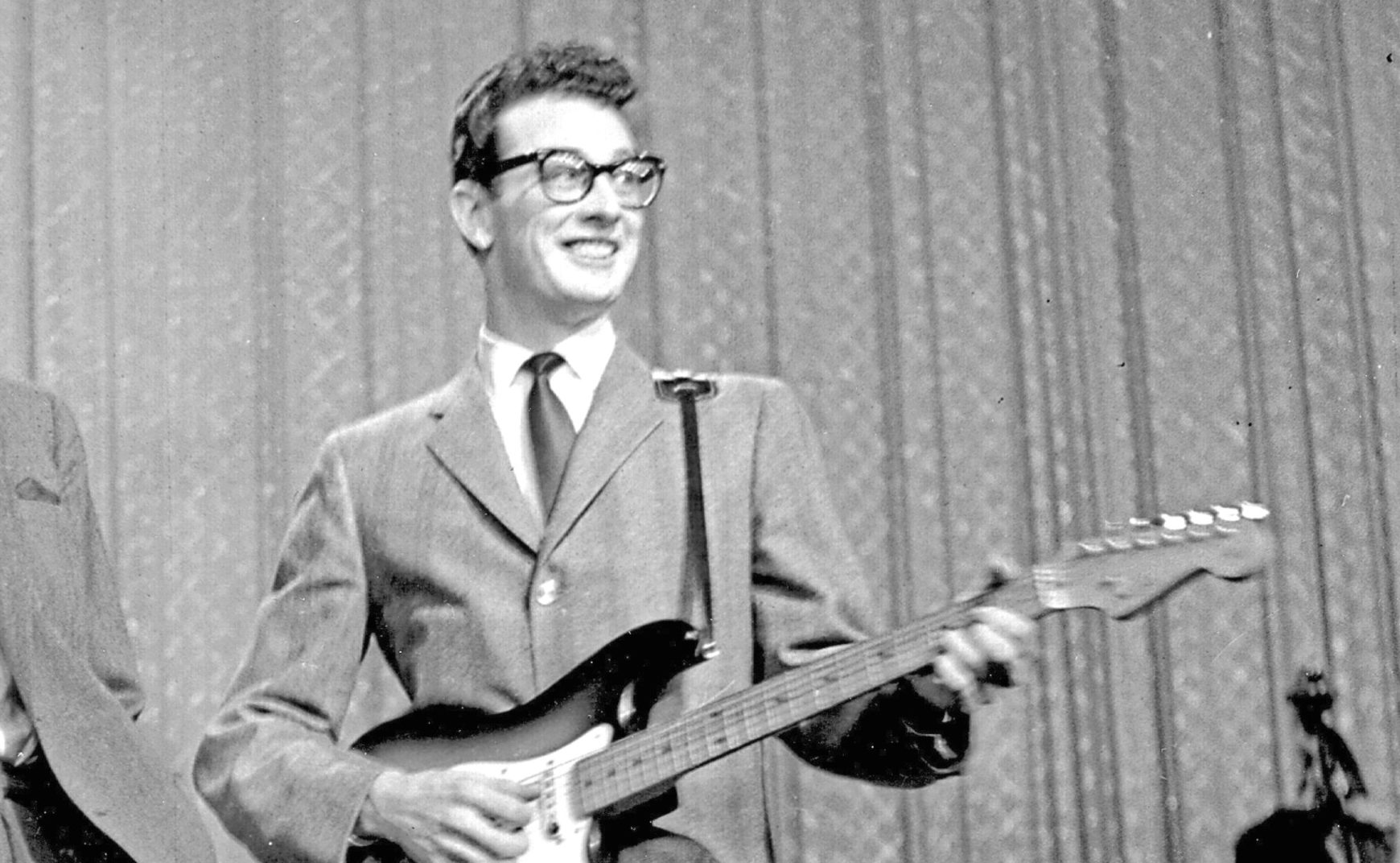
The fact that Buddy Holly died at age 22 means you can project anything onto him. You can call him a nerd or claim him as a proto-punk or a latent compositional genius who would have ended up making classical music or a country bumpkin that all the city folk wrongly absorbed. I’ve heard all these things. Been frustrated by the shallowness of the portrayals of him. The shitty broadway show. The unsatisfying movie. The annoying song about his death that I won’t even name because we don’t need to hear it again lest we have flashbacks to the cheesy choir teacher being obsessed with it.
(My Dad vs Buddy Holly, both age 19)
I’ve felt like they’ve never gotten Buddy right. Are missing who he was, though proto-punk might be closest. As if I have any clue. When you listen to him actually speak for himself, it tells you even less. Though I hear a confidence in his voice, it sits just under the politeness people always mistake for simpleness. I think he did know what was happening. I think he could almost see the future. Tell, in some sense, what might be coming, even if he didn’t have language for it.
For the 15 years I’ve lived in New York, every time I pass 11 Fifth Avenue I think, that’s where Buddy Holly’s NYC apartment was. If I’m with someone, I point it out. Biking delivering N95 masks to a friend who is a resident at Mt. Sinai, I can’t help but notice it. And I have no idea why. He isn’t my ghost, but my father’s. I think my father chose Buddy as a teenage idol because it portrayed a certain sensibility. A continental sophistication while still being Rock and Roll. Yes, Holly was popular in the US, but it was nothing compared to his popularity in England, in Europe. So for my Europe obsessed father, I think it was a move. And my father even tried to look a little like him growing up. As a kid, I assumed Holly was Jewish by association.
In the last months of my father’s life, while he was steadily declining from pancreatic cancer, I started to learn a little piano. I’d mostly learn with Holly songs, so as my father would hear me messing around, the notes would mean something to him. On piano, Holly songs are transformed into wraiths of the originals. Faint copies. So light they are almost nothing.
But take a Fender Stratocaster, and Buddy songs allow you to bang, for lack of a better term, on the strings. Guitar as a pure rhythm instrument. The runs and riffs are just little interludes, flourishes, fills, the real game is in the banging. They are fast, for the most part. They move. They sound better loud. You can hit a distortion pedal, speed up, hit only down strokes, and every single one can instantly become a punk song.
For some reason, in the late 80s and early 90s aka my toddlerhood, 40s and 50s music seemed to be everywhere. I remember there being multiple “oldies” stations on the radio, and that that moniker meant nothing anywhere close to The Beatles or whatever. I’m sure it had something to do with the business of radio and demographics at the time, but it was bizarre. I heard songs like “Boogie Woogie Bugle Boy” thousands of times in toddlerhood, without ever trying to, without my parents ever being interested in that music at all, they weren’t even alive when it was released.
From the age of 30 onward, my father only listened to classical music. He abandoned everything else. The jazz and Stevie Wonder records that populated the house seemed to just be artifacts of memory. But when Buddy Holly would sneak into the rotation of a radio station, he wrenched the volume upward. He played the record for us at home. Buddy became the first rock star I ever knew, but he wasn’t mine. Couldn’t be. My obsessions would come later. There weren’t enough drums in Buddy for that. I nodded my head, but didn’t fall in love.
I remember my father calmly explaining to me “Elvis wasn’t the king of rock and roll. Chuck Berry and Buddy Holly were the real kings of rock and roll.” And I adopted that opinion. Internalized it. Fuck Elvis. Chuck and Buddy are the real kings. Elvis was a TV show. Chuck was the real thing. Buddy was the other thing.
But right now I find myself consumed with that night in 1955 as a high school senior where Buddy opened for Elvis and Johnny Cash and the rest. I don’t think I suddenly care about that mythology—but because of the sleeping giants in the empty high schools around us now shuttered. The explosions lying in wait. Now likely hiding in Fortnite streams or apps I’m too old enough to even know about.
So I take guitar facetime lessons from the closest thing my college had to a Hendrix a decade ago. I try to learn how to force my hands into the right shapes, wonder what might have happened if I had this compulsion at 7 or 12 or 16.
I launch into Peggy Sue. And try to get the intro to That’ll Be The Day right at full speed, the slide into the shadow of an A chord. I feel the ghosts. Try to know them.

amazing post ! keep up the good work and
ReplyDelete† ††
O ^.^
|< ° ° ^.^
/\ ° ° ◦<o ◦<o
O\ O\
Matthew 13 [4] And when he sowed, some seeds fell by the way side, and the fowls came and devoured them up:
Revelation 13 [5] And there was given unto him a mouth speaking great things and blasphemies; and power was given unto him to continue forty and two months.
>>>>>>>>>>>>>>>>>>>>>>>>>>>
The end is near !
<<<<<<<<<<<<<<<<<<<<<<<<<<<<<<
Research your favorite Billionaires !
scratchwiththechickens@gmail.com
Seeking research funding
!